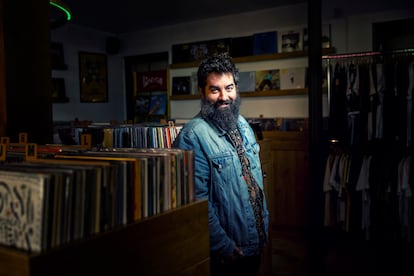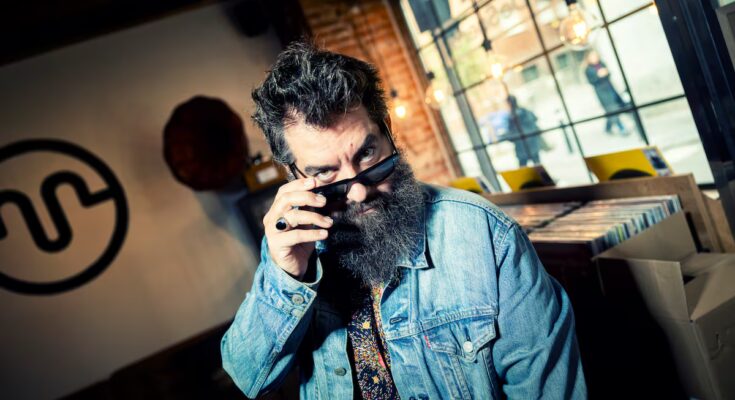Does the perfect song exist? «I don’t think so: rather, there is a journey towards it», says musician Miguel Marcos (Vigo, 41 years old), who reflects on songwriting in Journey to the perfect song (Liburuak), a book halfway between an essay and a manual that can be of interest to both performers and music lovers. Upcoming presentations: November 21st at the Monkey Week festival in Puerto de Santa María and 28th at the FNAC in Callao, Madrid.
Marcos, in projects such as Le Voyeur or Nueva Tragedia, director of the Musical Creation area of the School of Writers of Madrid, engages in listening, reflection and the acquisition of instruments, as opposed to robotic music interested only in data. From the Madrid neighborhood of Malasaña he responds with a thick beard and eyes full of curiosity.
Q. What is a song?
R. A popular creation that has a verse, chorus, bridge, etc. structure. It’s not like a soundtrack, a symphony or some electronic songs. An example: Bob Dylan enters Like a rolling stone a river song of five chords and from there a narrative that travels parallel. It was published 60 years ago!
Q. And now?
R. In genres such as electronic music or certain urban music, the canonical structure of the pop song becomes liquid. They are sonic enigmas, seen in Rosalía, Guitarricadelafuente or Billie Eilish. The latter, for example, welcomes Bad boy three blues chords in minor, puts them in the song, changes timeit even changes genre, which is unthinkable in the structure of the classical song.
Q. And that fluidity?
R. It has to do with the democratization of technology: everyone can compose and record at home. You can play based on intuition and research, and very hybrid songs appear. Here’s how it’s made up now.
Q. We need to talk about Rosalia.
R. The Rosalía brand creates a market and a trend wherever it goes. Everything else dissolves around it. It seems like there is no more music. From what little I’ve heard, it has to be said Lux It has some great songs. No rules, follow your own path. And achieving this goal is something very complex nowadays.
Q. Haven’t you heard everything?
R. I refused to listen to the entire album until I turn the volume down a bit. advertising hype and suffocating marketing. All in due time. I also didn’t go to see Radiohead in Madrid. This time, I don’t know why, I feel proud of experiencing the “fear of missing out” (FOMO). Maybe it’s age!
Q. Canonical songs… even if not perfect.
R. A milestone in songwriting is the Alleluia by Leonard Cohen: he desacralizes the religious in 80 verses composed in five years. Like a Rolling Stoneby Dylan, Space oddityby David Bowie Psycho-murderer by Talking Heads, which has an anempathetic function, when the music and the lyrics do not go in the same direction: you dance listening to the voice of a murderer.
Q. Spanish?
R. September from Los Enemigos: Josele Santiago took from the newspaper the story of a boy who committed suicide because he couldn’t bear the pressure of the September exams. The record Amadora from Tulsa is very interesting in terms of character construction, which is difficult to define in three-minute songs. Who is Lobo López from Kiko Veneno? Who is Leonard Cohen’s Suzanne? But both Lou Reed, Tom Waits, Josele, Tulsa, Patti Smith and Kiko Veneno are great tellers of small stories.
Don’t leave everything to the muses
Q. Can you learn to compose songs?
R. In the Anglo-Saxon world there are entire careers of song writingsong writing. But Spain is a country of interpreters, they teach us to reproduce and copy, but not so much to create. And that’s what I sought in my work as a teacher: to provide compositional tools and not leave everything to the muses.
Q. There are methods.
R. David Bowie goes to the cinema to watch 2001 A Space Odyssey and when he leaves he composes Space oddity. Bowie is an example of creative transversality: the song Heroes It comes from an expressionist painting. He is music’s greatest creative recycler: he has metabolised everything.
Q. You also learn to listen, he says.
R. Before To learn to compose you have to learn to listen, you have to develop your critical sense, not marketinian. Before the Internet, for example, we played songs by listening to them, trying to understand the chords with the instrument. Now the arrangements are taken from a website. We must reflect on music: the problem is that music is a show, no longer a place of reflection, struggle or relationship.
Q. The fast-paced world is not helpful.
R. There’s no time, technology distracts us, as soon as we’re on our cell phone, with something else, we don’t listen to entire albums. We hardly listen to entire songs! We change them quickly, on TikTok they last 10 seconds. The networks cannibalized the music. More than listening, we consume.

Q. I wanted to ask you if the song was successful compared to the album, but I see that it wasn’t so successful…
R. No, the song didn’t triumph, we simply went back to a system more similar to separatelike in the 50s or 60s. Except now the choruses have to come in at the fifteenth second, everything is robotic and follows certain patterns to work with the algorithm. Very fast auditory impacts, every 10 seconds a change to maintain interest.
Q. You mix more commercial authors with more cult authors. But those differences almost don’t matter anymore, right?
R. The song is a popular construction and, even if musical elitism still exists, musical tribes have become diluted and what matters is the data: the number of monthly listeners. We are classified like this between large, medium and small artists, only on the basis of that, the numbers. My students’ biggest concern is having enough numbers. We have distanced ourselves from creation.
Q. Is the rock dead?
R. Rock has transformed into other styles, it’s a little more liquid, more malleable. A Radiohead concert is rock, but it has to do with pop, with mainstreamwith mass culture. Rock can only survive in small fabric spaces, in rooms. If the clubs die, rock dies.
Q. Now it’s about filling WiZinks.
R. Him show Now it’s a karaoke, bases rolled, lots of lights, images, a big show… The essence of rock, the sweat, the small room, can be lost. Furthermore, the conditions for playing in clubs are now crazy, prices are disproportionate for small bands. And then there’s the festival bubble, which doesn’t burst.
Q. What’s going on there?
R. The goal for the guys is to bring listeners to Spotify: it’s not about selling records but about gaining the public’s time, getting listeners and getting invited by a promoter to festivals. And festivals don’t give particularly good treatment.
Q. In his book he recounts casual encounters in Malasaña, where he lives, with Javier Krahe or Moncho Alpuente. Is the touristy Malasaña still a rock neighborhood?
R. Less and less, but there is some cultural resistance, and not just in the bars. There are spaces for creation, things keep happening, more and more secret, even if sometimes you have to dodge selfie sticks to get there.



